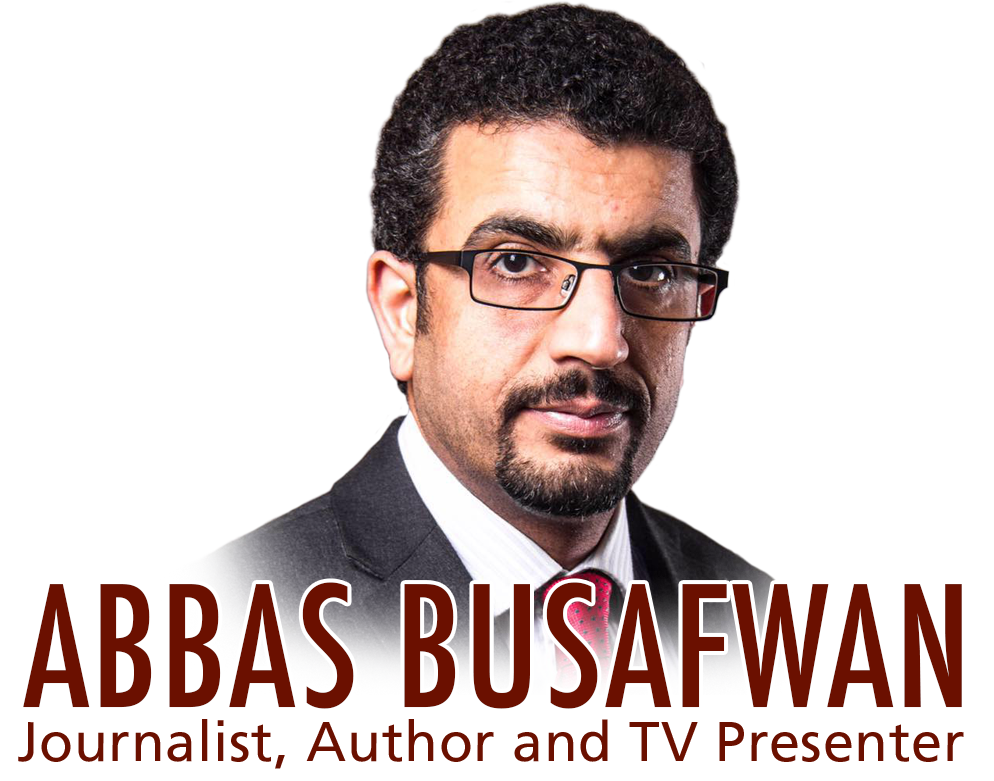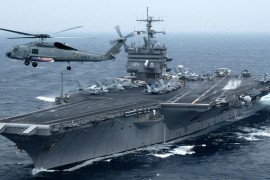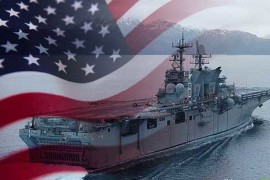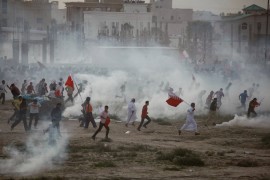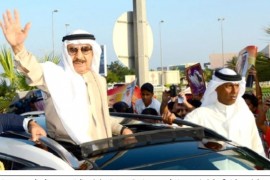King Hamad bin Isa Al-Khalifa succeeded to the throne in Bahrain on 6, March 1999. The new Amir found himself face to face with great challenges. But these challenges disappeared very quickly for many reasons, most of which were external circumstances with which King Hamad had nothing to do. Those truly great reliefs, opened an extraordinary horizon before the new Amir, who declared himself a King on 14, February 2002, availing him the opportunity to develop Bahrain economically, politically and socially, its regional ties, and to enhance Bahrain’s position in the international arena.
Here, I’ll focus on two very important reliefs, the First being the amazing increase in oil prices and the second the historic solution of the dispute with Qatar over Hawar Islands, and the extent to which the new King was able to take advantage of those two reliefs to turn Bahrain into a model for internal development and foreign relations.
In 1994, oil prices dropped to an unprecedented level since 1973, and in 1997 the average price per barrel dropped to as low as US $ 19, and continued to fall reaching US $ 12 in 1998. Prices did not record a sustained recovery until 1999 when the average price per barrel rose to about US $ 15 in April 1999, i.e one month after King Hamad’s succession to the throne. Prices, then, continued their gradual rise until they reached close to US $ 20 in February 2001. This coincided with the voting on the Notional Action Charter, which was supposed to open the doors for a new era of reform and national conciliation in the country, leading to the formation of an elected parliament, and the enhancement of citizenship. However, the reality was different when the official establishment exclusively issued the new constitution one year later, leaving the opposition to feel betrayed by the King, and shaking the confidence in his programme. Despite that, oil prices continued their upward trend reaching about US $ 24 in 2001 in coincidence with the events of 9/11 and the blowing up of the Twin Towers in New York.
When the King issued the Constitution of the Kingdom of Bahrain without a popular referendum in February 2002 , providing for a parliament half of whose members only were elected. The oil market seemed to be rewarding the new King, with the prices continuing to rise, to break the US$ 30 per barrel barrier with the parliamentary elections at the end of 2002, which were boycotted by Al-Wefaq and some opposition groups in objection to the new constitution and the division of constituencies. So, as the King was going ahead with his plan with total disregard for the opposition protests, the oil market was witnessing an unprecedented upsurge in prices providing the King with financial resources he had not anticipated when he began his rule. There is no doubt that the increase in oil prices was a tremendous boost to his unilateral approach.
In the year 2006, when the second version of the parliamentary elections was held, oil prices doubled and reached US$ 70 per barrel and again recorded their highest level in history when they reached US$ 145 per barrel, in 2008, However the average price during this year was around US$ 100 due to the global financial crisis and the drop in prices, to US$ 80 in 2010, which was the year in which a severe security blow was delivered to the radical opposition groups, reminding people of the state security approach, which was believed to have ended forever when King Hamad revoked the state security courts law, which had been the cause for dissolution of the Council of Deputies in 1975. A law which had remained in force until the year 2001.
The other event in the year 2010 was the third round of parliamentary elections, participated in by the opposition societies, who capitalized on the security crackdown in an amazing way for their elections campaign, to claim that the aim of the crackdown was to exclude the opposition from the parliament. Al Wafeq won 18 out 40 seats, which is the quota determined for it by the unfair constituencies.
In February 2011, and the flare up of the Pearl Roundabout uprising oil prices recovered and exceeded US$ 100 pb, which is the average price prevailing until now.
Thus, during one and a half decades of King Hamad’s rule substantial financial surpluses were accumulated, added to them one billion dollars per annum paid to Bahrain by GCC states since the year 2011.
In the light of that, the living conditions of Bahraini citizens did not improve in a manner that is proportional to the level of oil prices. The standard of services deteriorated in the fields of health, education and housing. In the field of housing, the number of housing applications reached some 50,000 applications, according to official statistics. The authorities failed in keeping their promises of providing a house for each citizen. The more obvious failure was the non-building of the Northern City and three other cities, whose construction plan had been announced since 2002. As opposed to that, private townships were expanded, mostly owned by new financial barons, who are effectively the fascades of Al-Khalifa finances and their allies.
Former MP Abdul Jaleel Khalil estimates “the total area of public land taken over illegally (to build townships .. etc) at 65 square kilometers with a minimum value of BD 15 billion” These were statistics revealed by a parliamentary commission of inquiry headed by Khalil who was then the leader of Al-Wefaq parliamentary fraction before it resigned in 2011. Despite the unprecedented financial abundances, the public debt is expected to rise to a new record level in the current year due to borrowing. It will go up from BD 4.2 billions in 2013 to BD 5.9 billions at the end of this year, i.e more than 52% of Bahrain’s GDP, and then to BD 7.7 billions in 2018 representing more than 61% of the GDP, “Modies Investors Services” have reduced Bahrain’s credit rating by one point, and warned further downgrading in future due to the government’s weak financial position, and projections of slow economic growth in the middle term.
Riayadh and Doha a hot battle using a cold language (http://www.alwasatnews.com/4032/news/read/812021/1.html)
The military and security establishment has been the main and the largest beneficiary from the increase in oil prices, with an expenditure level of 30% of the total state expenditure. It is obvious that this huge budget (about BD 855 million) establishes three tragic facts: First: This budget increases the security menace and the number and equipment of internal security and the intelligence services. Second: it increases the size of material and spiritual differences between Shi’as and Sunnis, because these establishments hardly employ any Shi’as. The Third point is the increase in political naturalization aimed at demographic change. It is known that illegal naturalization is concentrated on in the military establishment. It is for this reason that all the policemen killed in protests rocking Bahrain since 2011 are non-Bahrainis.
The financial savings and surpluses which were supposed to reduce the class differences between the citizens, and spread more justice and equality, went, instead to increase borrowings, put heavier burdens on the citizens, and consolidate despotism and discrimination with the Shi’as representing a tiny minority of leadership positions in government institutions, while their absence in the military and security establishment is almost total. As for the financial sector which may be considered the other arm for despotism, and discrimination in Bahrain, Shi’as are not permitted to establish banks, and their employment in the sector is confined to low positions, and absent in the senior positions. Successive state budgets do not show how financial surpluses are spent, as was noticed by the Bahraini Transparency Society. The leader of “Wa’ad” movement, Ebrahim Sharif who has been sentenced for five years, Riayadh and Doha …… (http://aq.be/b888d7)and who is a professional banker, sees that the Royal Court budget is secret, and the successive budgets passed by the Parliament do not give any information about it, not even a single figure. So, the relief in oil prices and their historic rise over a decade and a half of Hamad’s rule had negative results, increasing all kinds of evil. The military establishment inflated in size, discrimination was accelerated and became open and clear, naturalization policies were implemented without any hesitation, theft of public lands increased and the gap between the rich and the poor widened.
The only thing that saw a downward trend was the standard of services which deteriorated forcing the citizens to resort to private clinics and private schools. I am not certain what the situation will be like without those surpluses, but the level of evil might be lower than the frightening situation we are witnessing at present. The oil income allowed the King to implement his policies independently with total disregard for any popular legitimacy or any sense of responsibility towards the country and its citizens. This was, undoubtedly, the essence of the causes of the historic uprising of 14, February 2011.
The Second Relief: Settlement of Dispute with Qatar over Hawar Islands
One March, 16, 2001, about two year after the new Amir’s succession to the throne, the International Court of Justice pulled down the curtains on the long and bitter dispute between Bahrain and Qatar, by awarding Bahrain the right of sovereignty over Hawar Islands and Jarada Plot. It awarded Qatar the right of sovereignty over Zubara and Fasht-El-Deibel, while allowing the latter (Qatar) the shipping rights in the territorial waters between Hawar Islands and other Bahraini Islands, in addition to dividing the maritime boundaries between the two countries.
King Hamad was supposed to have been fortunate that the international verdict was satisfactory to both parties. That event was meant to have availed the new Amir a better opportunity to concentrate on the complicated domestic issues, and indeed a historic opportunity to forge stronger ties with the emerging Doha.
The Opposite happened and the Bahraini authorities went on to insult Qatar and its officials, and to mention Qatar’s name in the aggravating political events in Bahrain. In an Iftar banquet held on the 8th of Ramadhan 1431a.h. (18/8/2010), King Hamad accused Qatar of being behind an opposition group of 23 activists arrested in mid-August 2010 and accused of plotting to stage a coupe against the regime, as usual, just a few months before the “Arab Spring”.
Wikileaks documents may help to understand the official Bahrain stance towards the State of Qatar: “In a document numbered: MANAMA 184606 dated 11/1/2006 classified as secret, King Hamad is complaining that Qatar is becoming an Iranian satellite state, that the Qatari Air Force is employing more than 80 Iranian pilots, Qatari hospitals have Iranian medical crews and Qatar has set up a special port for Iranian exports. He points out that Qatar has been bought by Iran while distancing itself from Saudi Arabia … Riyadh and Doha.., a hot battle using a soft language (http://www.al-akhbar.com/node/8849).
Therefore the Bahrainis authorities stance towards Qatar is not better than their stance towards Iran, and is fed by what Al-Khalifa family believe that Qatar, or at least a part thereof (Zubara) is supposed to be under Al-Khalifa rule. Al-Khalifa feel more jealous as they see the huge Qatari oil and gas wealth. The other important dimension is that Al-Khalifa don’t see Al-Thani “as an ancient dynasty, it was not known 30 years ago, and became rulers of Qatar by shear coincidence”. A member of Al-Khalifa family told the writer “Al-Thani are fortunate to rule Qatar”, our ancestors shouldn’t have left Zubara at all, to Bahrain, which at the time (in 1783) was very lucrative as islands with greenery and water in the midst of barren deserts.
Thus, Manama is not refraining from speaking about Qatar in a language that lacks diplomacy to the extent that is difficult to interpret except by saying that there is an absence of wisdom, although Qatar had officially supported the Saudi military presence in Manama, and restrained Al-Jazeera Arabic Channel from covering the Bahrain spring. The government of Bahrain did not appreciate that and spared no opportunity in creating problems with Qatar! (see the Article: Qatar and Bahrain … The lost affection).
So, King Hamad may be recorded as having failed drastically in forming a solid relationship with Doha. It is correct to say that this is a part of the Saudi foreign policy followed by Bahrain, but the issue is not confined to cold relations, but goes beyond that to entering into a cold war, which is baseless, unjustifiable and contradicting the strategic interests of Bahrain with a sisterly Gulf state.
In fact, the administration of the political case was not much different from that of the huge surpluses of oil income and the relations with Qatar which were promising. Oil income was injected into the infrastructure of despotism and into the consolidation of the policy of discrimination and naturalization. Hawar Islands (One Third of the area of Bahrain) were turned into an almost complete private property of the ruling family and the relations with Qatar continued to deteriorate.
The King did not capitalize on the absolute support given to him (98.4%) after to National Action Charter vote, to achieve a wader national conciliation. He did not invest the oil money to adopt a social and economic policy based on developing the country and raising the status of its citizens in all aspects. Nor did he use the solution of the border dispute with Qatar to achieve an economic integration between the two sisterly countries, as the UAE is doing with Iran, Qatar and Saudi Arabia.
King Hamad did not benefit from having initiated his so-called reforms before the terrorist events of 9/11 in the USA (he initiated his reforms in February 2001). In this case too, events played in favour of King Hamad. They provided him with an opportunity to alleviate the US pressures calling for democratization of the entire ragion at the time.
The King used that opportunity, only to consolidate his unilateral plan of action, instead of using it as a better opportunity to achieve national re-conciliation without external pressure. Thus, instead of turning Bahrain into a model to be followed in domestic reform, economic and developmental construction, and the administration of foreign policy, it became a non-desirable model. After one a half decades of his reign, King Hamad turned from an internationally acclaimed reformist character into an ostracized character, or at least a character which enjoyed no respect and appreciation internationally. In Bahrain, he moved from the position of a King whose car was carried by the crowds (2001) to one whose pictures are being stamped upon and whose downfall is being shouted by people
